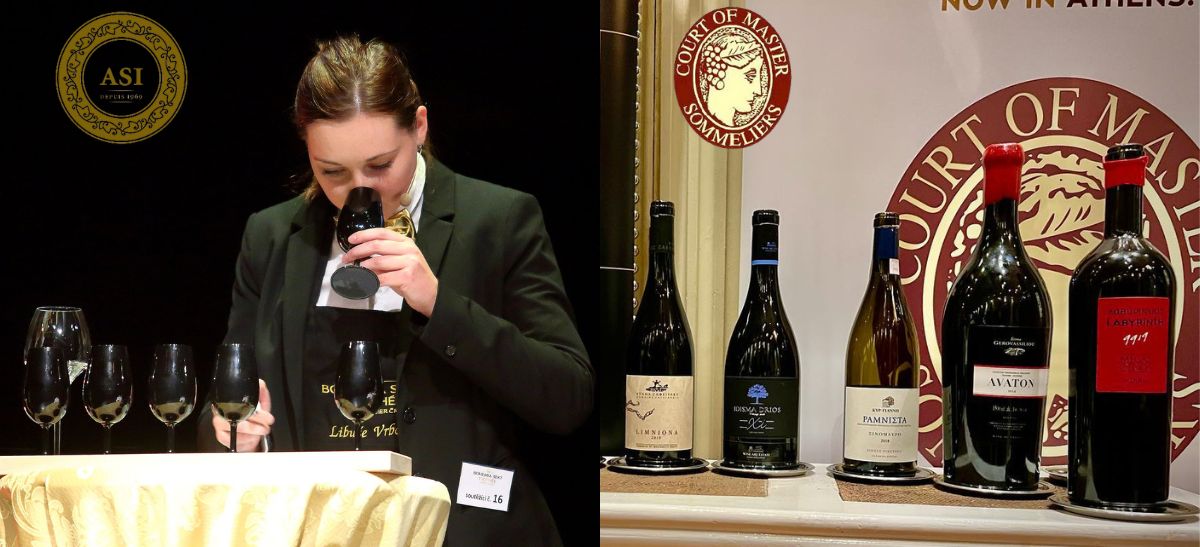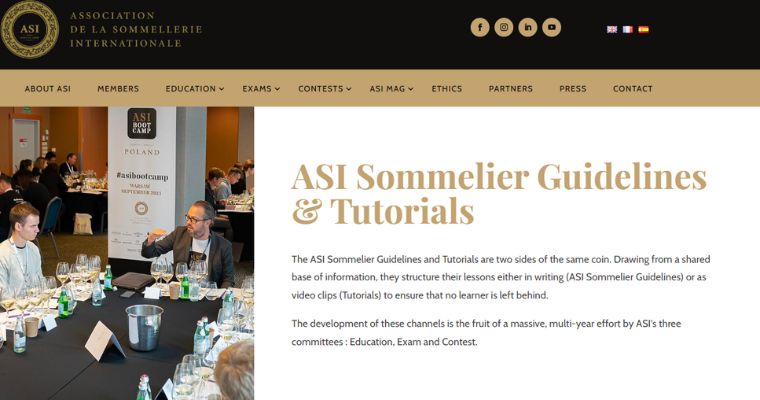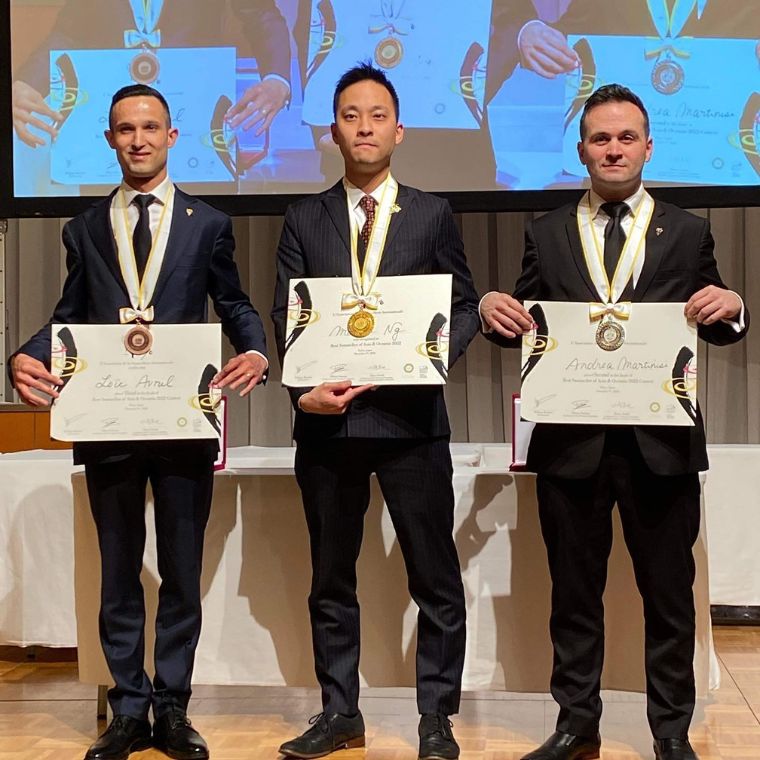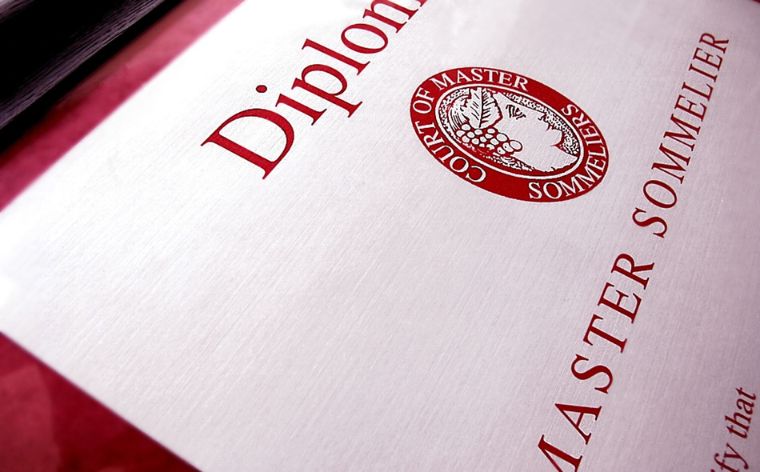Early Bird
Deadline
January 31, 2026
Judging
Date
May 18, 2026
Winners
Announced
June 10, 2026

Advancing a career as a sommelier currently requires certification or qualification. It hasn’t always been so, especially in Europe. For aspiring sommeliers, a divide previously existed between Europe, with its emphasis on practical training, on the one hand, and the US and UK, with their emphasis on education and qualifications, on the other. This is fading. In 2014, Swedish sommelier Arvid Rosengren wrote on GuildSomm: “The title ‘sommelier’ is not protected or restricted, not even France, meaning that anyone employed as a sommelier is a sommelier. No education or certification is needed. And while autodidactic knowledge was very much the norm only 10 years ago in much of Europe, almost all professional sommeliers today have some sort of specific education in wine.” CMS has come to dominate the field in the US and UK, while the Association de la sommellerie internationale (ASI) still appears favored in continental Europe and South America.
[[relatedPurchasesItems-41]]
Both organizations offer levels of certification. And the top levels—ASI’s Diploma and CMS’ Master Sommelier—are nothing to sneeze at. At last count, there were 427 people worldwide who had earned the ASI Diploma (and even fewer with the “Gold” standard) and the CMS European branch says, “less than 300 candidates have earned the title Master Sommelier.”
The CMS levels are Certified Sommelier (CS), Advanced Sommelier (AS), and Master Sommelier (MS), and the ASI levels are ASI Certification 1, ASI Certification 2, and the Diploma, which have levels of Bronze, Silver, and Gold. So how do you choose which certification to pursue?
Both are based on examinations of wine and service knowledge, testing the skills sommeliers require to profitably sell wine in a hospitality setting. CMS does a bit more regarding education, particularly by offering classes, but in the end, both programs involve a huge amount of self-study and experience, especially for the higher levels. ASI believes in sommelier competitions as a way to encourage learning and advancement.
ASI has national member organizations in various countries worldwide, although notably the United States only has “observer” status. There are 61 member countries and five observer countries; there are numerous member organizations in Latin America in addition to Europe. ASI has an education program and standardized exams.

Image: Association de la sommellerie international; Source: Association de la sommellerie international
ASI offers what it calls “Grids and Tutorials” (online) for sommelier education and also runs a Bootcamp, which debuted in 2021. The aim of the Bootcamp is to provide sommeliers from around the world with three days of high-quality, intensive masterclasses, workshops, and tastings in person. Since the Bootcamp targets a large group of sommeliers, the focus tends to be more towards the educational purpose of the event than on sommelier competition preparation, which ASI also sponsors.
The ASI exams consist of three levels: ASI Certification 1, Certification 2, and Diploma.
1) ASI Certification 1 assesses whether a prospective sommelier has mastered the core knowledge of international wine.
2) ASI Certification 2 is aimed at those who already possess substantial professional experience and who are able to hold the responsibility of head sommelier.
3) The ASI Sommelier Diploma is reserved for members of the sommelier community who achieve a “high standard of service together with a deep knowledge of world food and wine, of the management of the beverage sector and of the culture of the vine and wine.” There is a second language component (English, French, or Spanish). Candidates who achieve at least 60% on the exam in a foreign language are awarded a Silver designation; those who achieve 70% earn Gold. A Bronze designation was added in 2019 for those who achieve the same level of expert knowledge but who are not fluent in a foreign language. Exams are administered by the national associations and not by ASI directly. Notably, ASI member of the Canadian Association of Professional Sommeliers (CAPS) requires certain college courses to become certified as a sommelier.

Image: ASI - Association de la Sommellerie Internationale, Tokyo Japan; Source: Facebook
ASI qualification exams cover the gamut of sommelier knowledge: practical and management skills, knowledge of the hospitality industry, sensory analysis, food and drinks pairing, theoretical knowledge of beverages, and worldwide wine knowledge. For the Diploma exam, questions about France, Italy and Spain combined shall not be more than 50% of the points on the wine theory assessment.
The Court of Master Sommeliers, like the WSET and Institute of Masters of Wine (IMW), was founded in England; they share a similar history. CMS’ focus, however, was on enhancing the diminishing number of restaurant wine service professionals in the late 1970s. In 1969, IMW members, among others, offered a test at the Vintner’s Hall designed “to encourage sommeliers to become professional, to study,” according to Brian Julyan MS. Later, the CMS was created to provide industry-standardized international sommelier qualifications through examinations; the organizing members came from the Vintners Company, the IMW, The British Hotels & Restaurants Association, The Wine & Spirit Association of Great Britain, and The Wholesale Tobacco Trade Association.

Image: Court of Master Sommeliers; Source: Court of Master Sommeliers
Choice in programs is limited and hierarchical. If someone wants to study through the CMS program, he or she must start from the ground level and work up through the hierarchy. This means getting the Introductory certificate, which comes before CS. It is the start of the CMS journey and involves a two-day program, with the exam taking place on the morning of the third day. CMS Americas also now makes this course available online, with scheduled exam dates, with or without included wine. While this is the entry-level qualification of the CMS program, the study is expected prior to taking the class. This differs from wine trade WSET programs, where Levels 1 and 2 may be skipped and students can start with Level 3. Similar topics are covered in each level, with sizeable knowledge jumps between levels, ultimately leading to the Master Sommelier title. CMS in the Americas has now introduced a number of changes to how the AS qualification is received.
The Court of Master Sommeliers keeps everything in-house regarding teaching and course organization; to enroll in CMS classes or exams requires registration. The CMS websites post upcoming course and exam information with all the relevant details. There are some wine schools, like the San Francisco Wine School, that offer programs to prepare students for CMS exams. CMS Americas offers a Deductive Tasting Method Workshop. Notably, the Institute of Culinary Education in New York offers a unique combined CS course and exam.

Image Source: Facebook
As with ASI, there’s a lot to learn before attempting certification. The Practical Service Aspects at the CS level, for example, include the following: Demonstrate effective recommendation of Aperitifs & Classic Cocktails. • Recommend Wines, for each course of a menu, to include dessert and fortified wines. • Recommendations to include: producers and vintage knowledge. • Service of Spirits and Liqueurs. • Spirit types and producers. • Product knowledge, flavor profile, and service requirements of the above. • Food and wine pairing with effective reasoning for choice. Ability to recommend alternatives. • Demonstrate the professional service of sparkling wines. • Recommendation – Types quality levels, and alternative suggestions. • Opening, service, pouring, and refilling. • Carrying the tray to serve and clear glassware.
In sum, both CMS and ASI provide serious sommelier qualifications to advance a career in this area. Both programs continue to evolve and offer the community and educational support. Depending on your geographic location, you may decide to choose one or the other.
Enter your Wines now and get in front of top Sommeliers, Wine Directors, and On-Premise Wine Buyers of USA.
